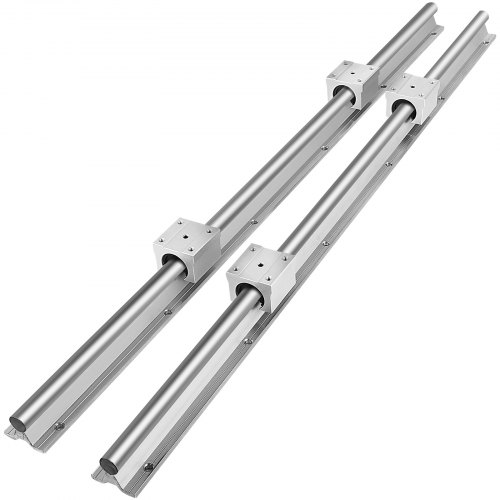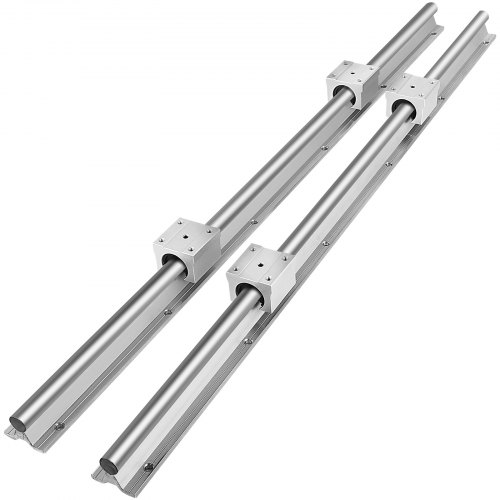 (210)
(210)
 (210)
(210)
Linear rails are the backbone of modern automation and machinery, providing smooth, precise movement in a myriad of applications. From intricate 3D printers to robust industrial machinery, the incorporation of linear rails is pivotal in enhancing performance and reliability. This article delves into the world of linear rails, offering insights into their benefits, types, and practical applications, ensuring you make an informed decision for your specific needs.
Linear rails, also known as linear guides or linear slide rails, are mechanisms designed to offer guided motion along a single axis with high precision and minimal friction. These components are critical in achieving accurate linear movement in machines and are widely utilized in various industries for their efficiency and durability.
Selecting the appropriate linear rail is paramount in machinery design. It not only affects the precision and efficiency of the motion but also impacts the longevity and reliability of the equipment. Understanding the different types of linear rails and their specific advantages is essential for optimizing your machinery's performance.
These are among the most common linear rails, known for their high precision and load capacity. Ball bearing linear rails use circulating ball bearings to minimize friction and enhance movement smoothness, making them ideal for high-speed applications.
Roller bearing linear rails offer higher load capacities and rigidity compared to ball bearing types. They are particularly suited for applications requiring robust performance under heavy loads.
Designed for applications with limited space, miniature linear rails provide precise movement in compact designs. They are often used in medical devices, small CNC machines, and robotics.
For industrial applications requiring maximum durability and load capacity, heavy-duty linear rails are the go-to option. These rails are designed to withstand harsh conditions and heavy use, ensuring long-term reliability.
The primary advantage of linear rails is their ability to facilitate precise and accurate motion, crucial for applications like machining, measuring, and assembly processes.
Thanks to the rolling contact between the rail and the bearing blocks, linear rails significantly reduce friction, leading to smoother motion and extended machinery life.
Linear rails are engineered to carry substantial loads, making them suitable for a wide range of industrial applications, from automation to heavy machinery.
With various types available, linear rails can be tailored to meet the specific needs of different applications, providing flexibility in design and functionality.
Linear rails find applications in numerous fields, underscoring their versatility and importance in modern technology.
In the realm of automation and robotics, linear rails are pivotal for achieving precise and efficient movement, whether in assembly lines, robotic arms, or automated storage systems.
For CNC machines, the precision of linear rails is vital in ensuring the accuracy of machining processes, contributing to the production of high-quality parts.
In medical devices, such as imaging equipment and surgical robots, linear rails play a crucial role in facilitating precise movements, directly impacting the effectiveness and safety of medical procedures.
The aerospace and defense industries rely on linear rails for the precision assembly of components, testing equipment, and maintenance platforms, where accuracy and reliability are non-negotiable.
Selecting the appropriate linear rail involves considering factors such as load capacity, precision requirements, environmental conditions, and space constraints. Understanding these aspects will guide you in choosing the most suitable linear rail for your specific application.
Proper installation and maintenance are crucial for maximizing the performance and lifespan of linear rails. Ensuring correct alignment, regular lubrication, and timely inspection for wear and tear can significantly impact their efficiency and durability.
VEVOR offers a wide range of high-quality linear rails, designed to meet the diverse needs of various industries. With a commitment to precision and reliability, VEVOR's linear rails are the perfect choice for enhancing the performance and efficiency of your machinery.
Integrating linear rails into your machinery is a step towards achieving unmatched precision, efficiency, and reliability. Whether you're involved in automation, manufacturing, or any field requiring precise linear motion, understanding the importance of linear rails and selecting the right type is crucial. With VEVOR's extensive selection of linear rails, you can unlock the full potential of your machinery and elevate your operations to new heights.
Ready to transform your machinery's performance? Explore VEVOR's range of linear rails and discover the perfect solution for your application. Embrace precision, efficiency, and reliability—choose VEVOR for your linear rail needs.
A linear rail, often referred to as a linear guide or slide, is a mechanical component designed to provide smooth, precise linear motion along a single axis. It consists of a rail, which is mounted on a surface, and a bearing block that moves along the rail. The mechanism works by using ball or roller bearings within the bearing block to reduce friction, allowing for smooth and precise movement. This design is crucial in applications requiring high precision, such as in CNC machinery, robotics, and various automation systems.
There are several types of linear rails, each designed to meet specific requirements and applications. The main types include:
Choosing the right linear rail involves considering several key factors:
Maintaining linear rails involves several practices to ensure their longevity and performance:
Linear rails can be used in outdoor applications, but it's crucial to select the right type designed for such environments. Look for linear rails made from corrosion-resistant materials or with protective coatings to withstand weather conditions. Additionally, consider rails with sealing options to prevent ingress of dust, water, or other contaminants. By choosing appropriately designed linear rails, you can ensure reliable performance in outdoor or harsh environmental conditions.